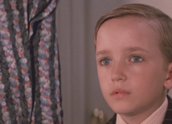


Careful He Might Hear You (1983)
Synopsis
Since the death of his mother in childbirth, six-year-old PS (Nicholas Gledhill) has been raised by his aunt Lila (Robyn Nevin) and her husband George (Peter Whitford), in a modest suburban house near Sydney Harbour. The boy has never known his father Logan (Peter Hargreaves), who left to mine gold when he was born, but PS has been raised with constant reminders of his mother, known in the family as ‘Dear One’. His mysterious aunt Vanessa (Wendy Hughes) returns from living in London, determined to wrest the boy from his modest circumstances. Vanessa is rich, neurotic and beautiful. She is also his joint guardian.
PS begins to spend time at her palatial house on the opposite side of the harbour. She enrols him in a private school, showers him with gifts and corrects his table manners. During a storm, she takes the boy in her arms, overcome by her terror of lightning. She pays for Logan to return from Broken Hill, but he rejects her attempt to rekindle their brief affair. Nor will he agree to give her sole guardianship of the boy. PS overhears their argument, in which Logan tells her she is incapable of love. A drunken Logan leaves Sydney without giving Lila the legal papers she needs to block Vanessa.
As the Depression worsens, George loses his job. Lila asks PS not to tell Vanessa, but she finds out. Vanessa asks a court to award her custody of the boy. Lila and George fight to stop her, but the judge misinterprets the boy’s wishes. PS is forced to live with Vanessa. He withdraws all affection, pushing her towards a nervous breakdown. Defeated, Vanessa tells him that he can return to Lila and George. She dies in an accident on the harbour and PS is haunted by her loss.
Curator’s notes
Careful He Might Hear You is a rare Australian film, a full-scale melodrama. It is more nakedly emotional and heightened in style than almost anything in the modern era of Australian cinema. At times it feels like a Hollywood film of the 1940s, something that might have been directed by Alfred Hitchcock or Douglas Sirk, the king of Hollywood melodrama. Ray Cook’s feverish orchestral score is far more dominant than was customary in the early 1980s, and it gives the film an unashamedly emotional quality. It is easy to imagine this film in black-and-white, with Bette Davis in the role of Vanessa. That describes the outer layer of style. Beneath that, it is a thoroughly Australian story, based on a semi-autobiographical novel by Sumner Locke Elliott.
As well as being about a custody battle and the emotional life of an unhappy child, it’s preoccupied with questions of identity. The boy is caught between Vanessa, who disavows her Australian origins, her working-class sister Lila who has always resented Vanessa’s pretensions, and an absentee father Logan who represents both the vivid masculinity and complete unreliability of the red-blooded Aussie male. At risk is the heart of a boy who doesn’t know which way to turn. PS is attracted by Vanessa’s goddess-like beauty, but he aches for the life he had, and the father he wishes he had.
Every performance here is superb, but the film succeeds largely because of the casting of Nicholas Gledhill. He brings an extraordinary honesty and lack of guile to the role of PS. This was not the first attempt to make a film based on Locke Elliott’s book. The American director Joshua Logan (who made South Pacific, 1958) tried in the 1960s to do it with Elizabeth Taylor as Vanessa. David Stratton, in his book The Avocado Plantation (1990, Pan Macmillan), says that Logan couldn’t find the right child during a casting tour to Australia. The Melbourne producer Jill Robb bought the rights and hired Michael Jenkins to adapt the book. Jenkins and director Carl Schultz had worked together at the ABC. The New South Wales Film Commission backed the project, which allowed it to raise a budget of $2.2 million.
Nicholas Gledhill is the son of a well-known Australian actor, Arthur Dignam. He was the first child that Carl Schultz auditioned. Schultz looked at hundreds more, then returned to his first choice. Carl Schultz had made two features before this, Blue Fin (1978) and Goodbye Paradise (1983), but there is nothing in either to suggest the high melodramatic style of this film. It’s a complete departure, not just from his previous work, but the prevailing styles of the time in Australian cinema. Careful… is an urgent, highly-charged, dramatically intense film, right from the beginning. Cinematographer John Seale imbues it with lush colours and a sense of natural abundance. The trees are beautiful, the gardens overgrown, the weather unpredictable and violent. It’s a sort of paradise – or it would be without the Depression and the return of Vanessa.
This strong sense of place implies a question: how well and how deeply are these people embedded within this southern paradise? Vanessa has married well and moved to London, where she acquired English upper-class manners and a sense of superiority – although the script makes clear she may have had that before she left. Her sisters, Lila, Agnes and Vere, are like three peas from a different pod. Agnes is a religious nut, Vere is a showgirl with a vast appetite for fun, and Lila is the steady one: loving, modest, asthmatic and less confident than her sister Vanessa. The antagonism between them goes back a long way, mirroring the relationship of many Australians to England and the English.
Careful… is partly about a young country separating from the old country, as the child separates from the parent. In this regard, the character played by John Hargreaves is crucial to the dramatic meaning. Hargreaves gives one of the best performances of his career, but he only appears in two or three scenes. Logan’s presence liberates the boy, allowing him to be himself and assert his wishes. He tells him to make trouble if anyone tries to make him do things he doesn’t want to do. That’s a turning point in the film. Father and son enter a kind of masculine pact. From this point, PS starts to act, rather than observe and obey.
The film did well in Australia in 1983, when not many Australian films were succeeding. It was also successful in the US and Canada; the National Board of Review in the US named it one of the ten best films of 1984. It competed at the Venice Film Festival, with Carl Schultz and Sumner Locke Elliott in attendance. Elliott was said to be very happy with this adaptation of his book.
Careful He Might Hear You was released in Australian cinemas on 22 September 1983. It dominated the Australian Film Institute awards that year, winning eight awards: Best Picture, Director (Carl Schultz), Actress (Wendy Hughes), Supporting Actor (John Hargreaves), Adapted Screenplay (Michael Jenkins), Cinematography (John Seale), Costume Design (Bruce Finlayson) and Production Design (John Stoddart). It was also nominated for Best Actor (Nicholas Gledhill), Supporting Actress (Robyn Nevin), Editing (Richard Francis-Bruce), Original Music Score (Ray Cook) and Sound (Syd Butterworth, Julian Ellingworth, Roger Savage and Andrew Steuart).
- Overview
- Curator’s notes
- Video 3 clips
- Principal credits
- Find a copy
- Make a comment
- Map
- Add your review



